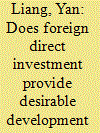| Srl | Item |
| 1 |
ID:
096230


|
|
|
|
|
| Publication |
2010.
|
| Summary/Abstract |
The present paper explores the role of China in the creation of the current global financial crisis and the impacts of the crisis on its economy. It argues against the view that the "saving glut" in China (along with other Asian emerging economies) played a significant causal role in the crisis. The global financial crisis did not engender much damage in China's financial structure, thanks to the relatively closed, bank-centered financial system. However, the impacts on the "real" side of the Chinese economy were hard felt. Growth and employment have fallen, largely due to the decline in exports and foreign direct investment. The crisis reveals the vulnerability of the export-dependent growth pattern. Policy responses of the Chinese Government, including monetary, fiscal and social policies, have helped to stem the downfall of the economy in the immediate term, but some of the policies have not addressed the structural problems of the Chinese economy and might well aggravate such problems over time. The present paper proposes a tentative reform blueprint to rebalance the economy and to sustain long-term growth.
|
|
|
|
|
|
|
|
|
|
|
|
|
|
|
|
| 2 |
ID:
076903


|
|
|
|
|
| Publication |
2007.
|
| Summary/Abstract |
Foreign direct investment (FDI) is often considered as a cost-effective and risk-reducing source for development finance. This paper, however, shows that FDI finance often entails underestimated risks and costs. FDI might react sensitively to business cycles and might not be as "permanent" as conventionally believed. FDI might also accelerate other forms of capital flow in times of financial difficulties and, hence, destabilize financial order. In addition to the risks, compensations to FDI and the high import-dependency of FDI-related trade lead to a considerable drain on the balance of payments. Moreover, the reliance on foreign capital for development finance is equivalent to building a Ponzi financing scheme and, therefore, is unsustainable. Given the fact that FDI financing is risky and costly and China does not lack savings, it is suggested in the present paper that China's efforts in attracting FDI should not aim at external capital provisioning
|
|
|
|
|
|
|
|
|
|
|
|
|
|
|
|